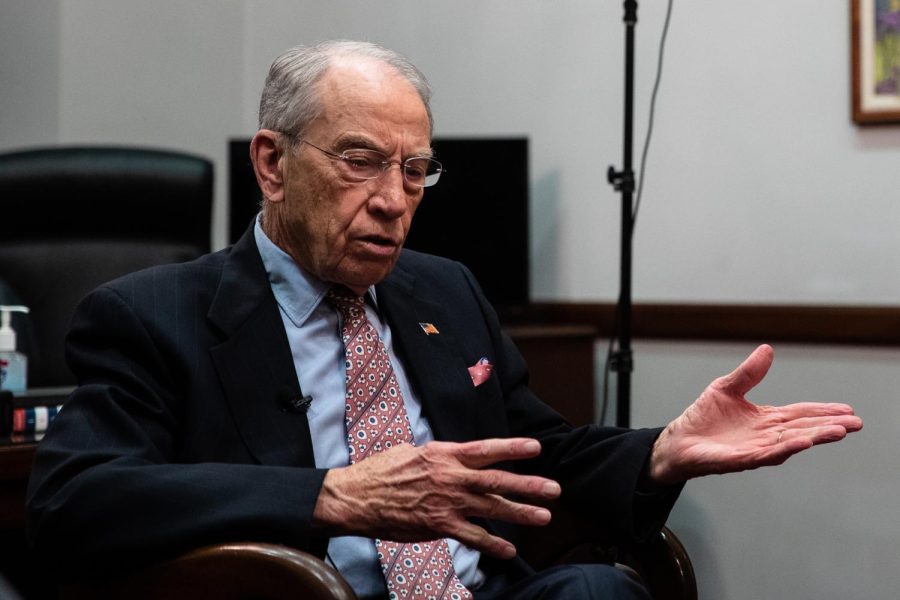U.S. Sen. Chuck Grassley, R-Iowa, speaks in a Daily Iowan interview at the Hart Senate Office Building in Washington, D.C. on Tuesday, April 5, 2022.
47 years and counting: Chuck Grassley pursues eighth Senate election
After 47 years in Congress, Iowa’s senior senator has become a mainstay in state politics. He says he is approaching this election no differently than years past, but Democrats say this is the year he can be beat.
May 3, 2022
In the Monroe County Courthouse on a snowy February day, Chuck Grassley stopped to speak with a small gathering of Iowans. Russia had just invaded Ukraine the previous night, and the people of Albia had questions. Grassley had answers.
Clad in a monochrome brown suit jacket and sweater, the seven-term U.S. senator from Iowa took questions from the approximately 20 people in the courtroom, ranging from Ukraine to inflation to the southern border. In his answers, Grassley, who at age 88 is the longest-serving Republican in the Senate, sometimes tied questions back to criticism of the Biden administration, and other times praised Democrats with whom he agrees.
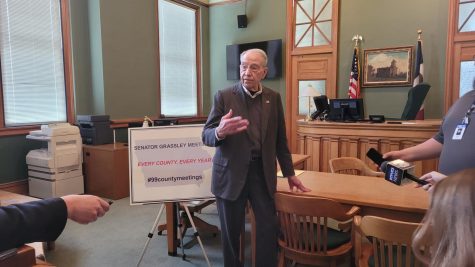
The stop was just one on Grassley’s 99-county tour, a political pilgrimage he’s done every year since he was first elected to the Senate in 1980. Dubbed “The Full Grassley,” the tradition he made has been embraced by other senators and governors in the state.
In the meetings, he visits courthouses, churches, high schools, and businesses, often holding public town halls, but other times hosting closed meetings with employees of businesses or interest groups.
Grassley’s critics are quick to note that this touted transparency project is not always what it’s cracked up to be — in Iowa’s largest and most Democratic counties, like Polk, Johnson, and Linn, Grassley often holds closed meetings, preventing access by passionate Democratic voters in those areas.
The tour is officially Senate business, not a campaign tour. But it’s a vital part of the retail politicking that’s kept Grassley in office for so long, those who know and work with Grassley say.
During a meeting at County Materials Corporation in Iowa City in April, Grassley said he visits businesses and schools in order to hear from people who wouldn’t normally come to his town meetings.
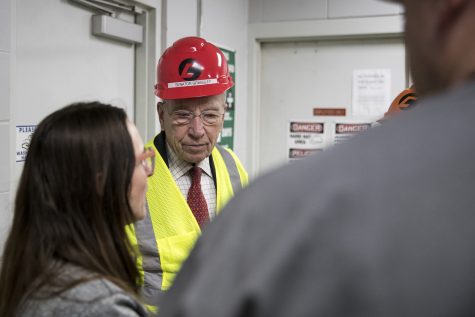
“What’s necessary about these eyeball-to-eyeball meetings — this is the best way of making representative government work,” he said. “I can see you and you can see me.”
Grassley has lived an almost solely political life. He was first elected to the Iowa House of Representatives at 25 in 1958 and climbed the ranks to a 1980 Senate election. He has represented Iowa in some form for more than one-third of the state’s history, and he now hopes to add another six years to that record.
Grassley would be 95 at the end of his next senate term, should he win reelection, and he’d place third among the senators who have held office the longest, after Democrats Robert Byrd of West Virginia and Daniel Inouye of Hawaii.
Grassley faces a Republican primary challenge from state Sen. Jim Carlin, of Sioux City, who is running to his right and framing Grassley as an establishment moderate. If fundraising is any indication, Carlin doesn’t pose a significant challenge to Grassley, and the incumbent is expected to easily win the primary.
As the presumptive nominee in the general election, Grassley said he’s campaigning this year just like he has in every election since 1958.
“I want to emphasize how it isn’t different,” Grassley said in an April interview with The Daily Iowan of how he’s approaching the 2022 election. “Because I’ve approached reelection from this standpoint: Just continue doing the very best job you can where you are and what you’re doing, and just continue to do it.”
Many Republicans are confident in his ability to retain the seat, including Eric Woolson, a Republican political consultant who wrote a 1995 biography of Grassley and worked as communications director for his campaign in 2010.
When Grassley ran against Democrat Roxanne Conlin in 2010, Woolson said the campaign strategy was about organizing and energizing voters at the grassroots level, and the 99-county tour was an essential part of that.
“Grassley’s advantage is, you visit all 99 counties every year, and you’ve done that year in, year out,” Woolson said. “Folks know you, they’ve had a chance to meet you and connect with you, and they remember that and they vote for you.”
Woolson, who isn’t involved with Grassley’s campaign this year, said he expects the senator’s campaign strategy to focus on his strengths and avoid engaging regularly with the Democratic nominee.
“That doesn’t mean that we won’t see outside groups on each side attacking the nominee from each party, but I think largely we’re going to see Grassley focus on Grassley,” he said.
Pat Grassley, Chuck Grassley’s grandson and the speaker of the Iowa House of Representatives, said his grandfather is not taking it easy during the election, despite high expectations.
“One thing that I’ve really learned from him is you can never take any election for granted,” the younger Grassley said. “I know when he hears talk like that, it probably goes against the way he’s operating his campaign and the way he’s running.”
Chuck Grassley cuts a distinguished figure at 6-foot-2, often sporting a suit or sweater as he traipses the state in his tour. He speaks with a grandfatherly Midwestern drawl, cracking jokes and bringing up the names of people he met 50 years ago in towns across the state.
Part of Grassley’s appeal, Woolson said, is his perceived authenticity. When Grassley speaks at public meetings, he talks fairly freely about his work in the Senate, noting when he’s for or opposed to something or when he needs more information.
“What you see is what you get, and I think Iowans really appreciate that,” Woolson said. “He says what he means and he means what he says.”
David Osterberg, an emeritus professor of public health at the University of Iowa, 12-year former state representative, and 1998 Democratic candidate who challenged Grassley for the Senate seat, conceded that Grassley has been effective at building trust with constituents.
“Going to every county in Iowa every year was very smart,” Osterberg said. “He also did a pretty good job on his constituency services … So I think that part of stuff you can’t argue with.”
The Democratic challenge
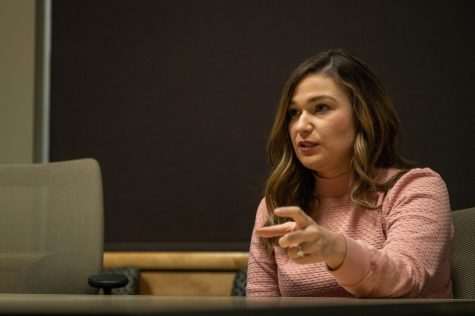
Three Democrats have lined up in an attempt to topple Grassley, with former U.S. Rep. Abby Finkenauer of Cedar Rapids and Navy Admiral Mike Franken of Sioux City jockeying for frontrunner status. Glenn Hurst, a rural doctor and member of the Minden City Council, who is less dominant in fundraising and media presence, is framing himself as the progressive alternative to Finkenauer and Franken.
A central question in the Democrats’ June 7 primary hinges on who will be best suited to take on Grassley, and each candidate is trying to make their case. Finkenauer, 33, one of the youngest women ever elected to Congress, often points out that she presents a stark contrast to Grassley.
Franken, a 64-year-old from rural Iowa, plays on his similarity to Grassley. A three-star Navy admiral, Franken says his resume will be hard for Republicans to attack.
“I’m a real tough target for the GOP,” he said at a forum with the other two candidates this month. “Born and raised in rural Sioux County, very rural. Think big, big family, small, small house. Real blue collar.”
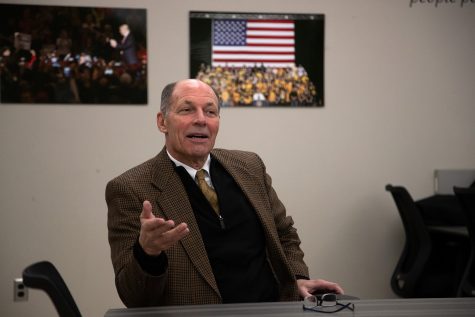
Despite Grassley’s continued success, Democrats say he is uniquely vulnerable in this election cycle.
In the most recent Des Moines Register/Mediacom Iowa Poll, the gold standard of Iowa polling, Grassley’s approval rating was tied for the lowest in the poll’s history, at 45 percent, with 43 percent of respondents disapproving of his work in the Senate.
The poll surveyed 813 Iowa adults between Feb. 28 and March 2, and has a margin of error of plus or minus 3.4 percentage points.
That’s a sharp downturn from Grassley’s last time on the campaign trail. In 2016, Grassley had an approval rating of 57 percent, and it’s been sliding steadily from 76 percent, the approval rating he enjoyed in January 2006.
The change is in part a reflection of the growing partisan gap among voters in general, but Democrats say it also reflects a reversal in the public perception of the senator.
Sue Dvorsky, former chair of the Iowa Democratic Party, said Grassley’s waning approval is in part due to a sharp partisan turn in the past decade.
Dvorsky said Democrats will attempt to tie Grassley to the policies of Iowa’s state leaders like Republican Gov. Kim Reynolds and the GOP-controlled Legislature.
Reynolds, who receives frequent praise from Grassley, is pushing the Legislature to pass a bill to provide public school-funded scholarships for students to attend private schools, a policy resisted by some rural Republicans and a majority of Iowans, according to the same Register poll.
Republican legislators, by the same turn, have stirred controversy this year with attempts to tightly moderate school library and classroom materials, with one suggesting librarians should be jailed for providing what the Legislature defines as obscene materials.
“Chuck Grassley has his fingers all over this, and he can’t run from it,” Dvorsky said.
But Republicans aren’t holding their breath in fear. Woolson said that, even in years that have been good for Democrats, Grassley has out-performed expectations.
“More than once, the Democrats have said, ‘This is the year that he’s vulnerable. This is the year that we’re gonna beat Chuck Grassley,’” Woolson said. “And it hasn’t happened yet. So, I’m of the mood that I’ll believe it when I see it.”
A farmer with political ambitions
Grassley’s political ambitions started young. He was born in 1933 in New Hartford, Iowa, to Louis and Ruth Grassley. He boasts that he’s lived in the same town, with around 570 people as of 2020, for his entire life.
Grassley’s mother was an advocate for women’s suffrage, Woolson said. She was one of the first few women in Iowa to vote in a special election the day after the 19th Amendment was ratified.
Grassley once confided in a high school baseball coach that he wanted to run for the Iowa Legislature as soon as he turned 21. Politics were a frequent kitchen table conversation when he was growing up with his parents and three siblings.
“We always were talking about government and politics and history within our family as I was growing up,” he told a group of high schoolers in Ottumwa earlier this year. “So, when I was even younger than you are, I had very much an interest in it.”
Grassley’s first and only election loss came when he ran for the Iowa Legislature at 22 against incumbent Republican Wayne Ballhagen, also of New Hartford. Grassley lost the primary by 81 votes, but he ran again in 1958 and won the primary, securing his seat in the heavily Republican Butler County.
Data visualization by Kelsey Harrell/The Daily Iowan
By his fourth Senate election in 1998, Democrats were already attempting to convince voters that Grassley had been serving too long. Osterberg, who lost to Grassley by a 38-percent margin in that election, said he drove around a 1958 pickup as part of his campaign to illustrate the age of Grassley’s political career.
Even at that time, Grassley was seen as an inevitability, and Osterberg said he had trouble fundraising during his election.
“You call somebody, maybe even somebody you know, and say, ‘Hey, Bruce, I’m running against Chuck Grassley, and we’ve known one another for a while, and I hope you can give me $200,’” Osterberg said. “And he’d say, ‘I’ll give you $50, because you’re going to lose, because you can’t beat him.’
“You can’t get any money when you’re running against Chuck when you know that you can’t beat Chuck,” Osterberg added.
But, Osterberg noted, fundraising will likely be easier during this election, with more energy from Democrats focused on voting Grassley out of office. Finkenauer and Franken have already raised $3.1 million and $1.8 million, respectively, according to FEC data. Grassley has raised $4.8 million during this cycle and ended the last quarter with a $4.6 million war chest.
Pragmatic bipartisan or right-wing devotee?
Throughout his Senate career, Grassley has made a point to highlight his work across the aisle. Even in the hyper-partisan world of the modern Senate, he has his bipartisan bona fides. Grassley was a key author, with Sen. Dick Durban, D-Ill., on the First Step Act, a Trump-era criminal justice reform bill that reduced sentencing for some nonviolent crimes and aimed to reduce recidivism rates. He was also one of 19 Republican senators to vote for President Joe Biden’s infrastructure bill, which brought $5 billion to Iowa for roads, bridges, broadband, and water quality.
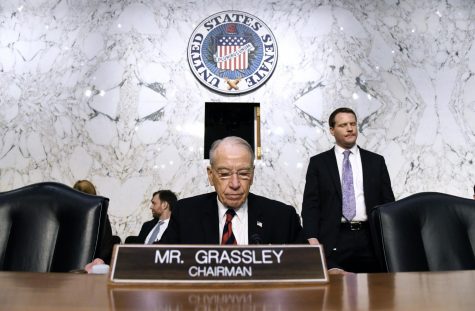
But Grassley, who sits among the most powerful Republicans in the Senate, is no stranger to wielding partisan power when the opportunity arises. As chair of the Senate Judiciary Committee, he blocked the committee from holding hearings on Merrick Garland, former President Barack Obama’s 2016 nominee to the U.S. Supreme Court.
Beyond the Supreme Court, confirmation of Obama’s judicial nominees slowed dramatically under Grassley’s judiciary committee. The Senate confirmed just under 29 percent of Obama’s nominees to federal courts in 2015 and 2016. By contrast, the Senate confirmed 58 percent of former President George W. Bush’s nominees to the courts between 2007 and 2008, when Democrats controlled the Senate.
Democrats contend that Grassley lost his bipartisan streak during the Obama and Trump years. “Chuck Grassley has changed” is a constant refrain among his three Democratic challengers.
Finkenauer often says that she should set up a “former Grassley voter confessional” in campaign stops, because of the number of people she encounters who used to vote for Grassley and are now looking to Democrats.
“I remember growing up in this state, we had Harkin, the Democrat, we had Grassley, the Republican, you kind of just thought, you don’t agree with them on everything all the time, but they just kind of have Iowa’s backs,” Finkenauer said at an event at Sanctuary Pub in Iowa City this year. “That’s kind of what we thought, and we know that’s not the case anymore.”
Taylor Foy, Grassley’s Senate spokesperson, wrote in an email to the DI that Grassley has consistently ranked among the top bipartisan senators in the Lugar Center’s measure of bipartisan lawmakers. In the most recent ranking of the 117th Congress, Grassley came in 12th among U.S. senators.
Foy also noted that as a senator, Biden also suggested withholding hearings on a Supreme Court nominee until after the presidential election in 1992.
“Throughout his tenure, Sen. Grassley has been willing to work with any member from any side of the aisle to advance policies that improve the lives and livelihoods of Iowans,” Foy wrote. “In this Congress alone, legislation introduced by Grassley has attracted the support of 43 of his 50 Democrat colleagues.”
In a June 2021 Des Moines Register/Mediacom Iowa Poll — before he announced his reelection bid — close to two-thirds of respondents said it was time for someone else to hold the seat, and some respondents noted age as a factor.
Grassley is the second-oldest senator in the U.S., trailing Sen. Dianne Feinstein of California by three months. Grassley hasn’t faced many of the questions about health and mental sharpness that Feinstein faces. He still gets up at 4 a.m. every day to run, he says, and he came out of a bout of COVID-19 last year with seemingly little trouble.
Pat Grassley said his grandfather’s seniority in the Senate is a plus, not a negative. Despite Iowa’s low population when compared with other states, the elder Grassley’s power in the GOP means Iowa is often represented in policy discussion.
“You look at any major issue that’s really gone on in the Senate for years,” Pat Grassley said. “Chuck Grassley has had a seat at the table and a finger on the pulse of those issues.”
Chuck Grassley, for his part, doesn’t see his age as a limiting factor in his campaign to hold on to his seat.
“I faced the same question six years ago when I was 81 or 82, and I’m still alive,” he said.
